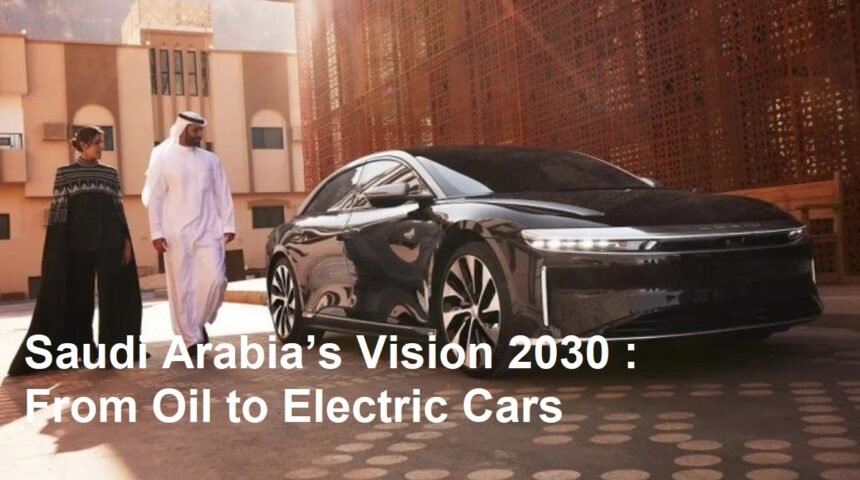Introduction: Why Vision 2030 Matters for Saudi Arabia’s Automotive Future
For decades, Saudi Arabia has been known as the world’s oil giant. But times are changing. With Vision 2030, the kingdom wants to move beyond its oil dependency and build a modern, diversified economy.
One of the boldest steps in this journey is its push into the automotive industry—especially electric vehicles (EVs). The story of Saudi Arabia Vision 2030 automotive isn’t just about new factories; it’s about economic diversification in Saudi Arabia, oil politics, and the birth of an EV industry in the Middle East.
The Core of Vision 2030
What Vision 2030 Aims to Do
Launched by Crown Prince Mohammed bin Salman, Vision 2030 is a national roadmap to reduce oil dependence and expand into:
- Technology and renewable energy
- Tourism and entertainment
- Advanced manufacturing, including automotive and EVs
Why the Auto Sector?
Cars are more than just vehicles—they represent industrial growth, jobs, and global recognition. By developing an automotive sector, Saudi Arabia signals it’s serious about becoming more than an oil exporter.
Tip for readers: If you’re a professional in engineering or manufacturing, keep an eye on Saudi Arabia—the automotive sector is creating new career opportunities.
Oil Politics: The Elephant in the Room
Why Oil Still Matters
Saudi Arabia remains a leading oil exporter, and oil politics still defines much of its global influence. But paradoxically, this wealth from oil is being used to fund investments in EVs and renewable energy.
Balancing Act
- Global role: Saudi Arabia leads OPEC and influences oil prices.
- Domestic policy: High oil revenues help finance non-oil projects, including EV factories.
- Strategic risk: As the world moves toward green energy, the kingdom must adapt or risk losing relevance.
Tip for readers: If you follow energy markets, watch how oil revenues are reinvested—this indicates how quickly Saudi Arabia can pivot to EVs.
Building an EV Industry in the Middle East
Lucid Motors and Saudi Investment
Saudi Arabia’s Public Investment Fund (PIF) is a majority shareholder in Lucid Motors, a luxury EV brand based in California. A major Lucid factory is being built in Saudi Arabia, aiming to produce thousands of vehicles annually.
NEOM and Smart Mobility
The futuristic city of NEOM is designed with clean mobility in mind, including EVs and hydrogen-powered transport. This showcases how Saudi Arabia wants to integrate EVs into everyday life.
Regional Competition
Saudi Arabia isn’t alone. The UAE and Qatar are also investing in EV infrastructure. Still, Saudi’s scale and funding power could make it the dominant EV hub in the Middle East.
Tip for readers: For investors, Saudi’s EV ventures—like Lucid—are worth tracking. They show how oil wealth is being converted into future-ready assets.
Challenges Facing Saudi Arabia’s Automotive Transition
1. Infrastructure Gaps
The EV charging network in Saudi Arabia and the wider Middle East is still underdeveloped. Without widespread chargers, mass adoption will be slow.
2. Market Readiness
Cars in Saudi Arabia are traditionally gas-powered, and fuel prices are relatively cheap. Convincing consumers to switch to EVs will take time.
3. Global Competition
China, Europe, and the U.S. dominate EV production. Breaking into this crowded space will require innovation and strong branding.
Tip for readers: If you’re an EV buyer in the Middle East, research charging availability in your area—it may influence whether an EV is practical right now.
The Bigger Picture: Diversifying Saudi Arabia’s Economy
The economic diversification of Saudi Arabia through EVs is more than just about cars. It ties into larger goals:
- Job creation: Local EV manufacturing plants bring employment for engineers, technicians, and service providers.
- Technology transfer: Partnerships with global companies bring know-how into the kingdom.
- Sustainability image: Moving into EVs improves Saudi Arabia’s reputation in climate and sustainability discussions.
Tip for readers: If you’re a student or job seeker, consider upskilling in EV-related fields—battery tech, renewable energy, or automotive design.
What This Means for Global Consumers
You might be wondering: how does Saudi Arabia Vision 2030 automotive impact someone outside the Middle East?
- Global supply chain: Saudi investments could stabilize EV production worldwide.
- New EV models: Lucid and other Saudi-backed brands may bring fresh options to international markets.
- Energy balance: If Saudi Arabia becomes a serious EV player, it could shift global oil and green energy politics.
Tip for readers: For car buyers abroad, keep an eye on Saudi-backed EV brands—they could become strong competitors to Tesla, BMW, or Toyota in the near future.
The Road Ahead: From Oil Power to EV Power?
Saudi Arabia is at a turning point. With massive oil reserves on one hand and a commitment to Vision 2030 on the other, the kingdom’s automotive experiment is a test of whether wealth from the past can fuel a sustainable future.
Possible Outcomes
- Success: Saudi Arabia becomes a global EV hub, balancing oil exports with clean technology.
- Partial success: The kingdom builds some EV capacity but remains heavily oil-dependent.
- Failure: Without adoption and infrastructure, EV projects struggle to take off.
Tip for readers: If you’re an investor or policymaker, monitor Saudi Arabia’s EV infrastructure rollout—it’s the strongest signal of whether Vision 2030 can succeed.
Conclusion: A Bold Shift Underway
The Saudi Arabia Vision 2030 automotive strategy represents one of the boldest industrial shifts in the modern world. By leveraging oil wealth to fund EV investments, Saudi Arabia hopes to lead the Middle East EV industry while reducing its reliance on oil politics.
But the road ahead is uncertain. Building an EV ecosystem requires consumer trust, global competitiveness, and strong infrastructure. Whether Saudi Arabia can deliver remains to be seen.
What’s your take on Saudi Arabia’s Vision 2030? Do you think the kingdom can successfully pivot from oil dominance to a thriving EV industry, or will oil politics hold it back? Share your thoughts in the comments—I’d love to hear your perspective!












